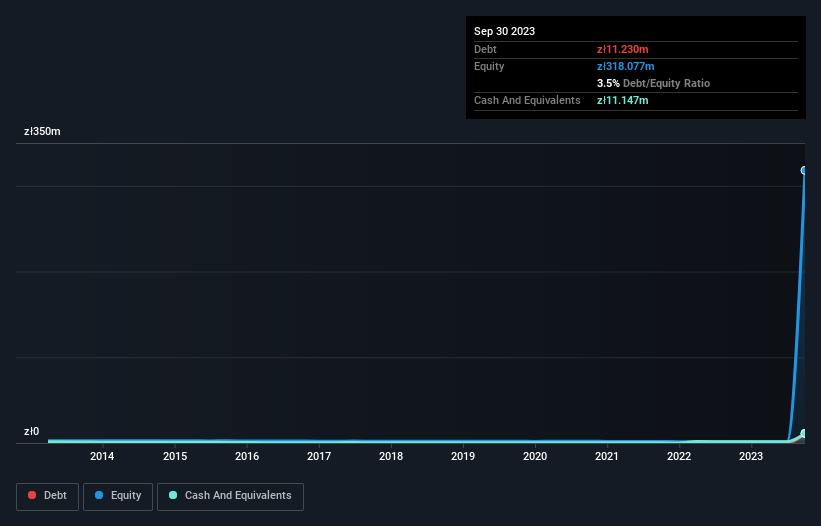
Some say volatility, rather than debt, is the best way to think about risk as an investor, but Warren Buffett famously said that 'Volatility is far from synonymous with risk.' When we think about how risky a company is, we always like to look at its use of debt, since debt overload can lead to ruin. We note that Honey Payment Group SA (WSE:HPG) does have debt on its balance sheet. But the real question is whether this debt is making the company risky.
Why Does Debt Bring Risk?
Generally speaking, debt only becomes a real problem when a company can't easily pay it off, either by raising capital or with its own cash flow. Part and parcel of capitalism is the process of 'creative destruction' where failed businesses are mercilessly liquidated by their bankers. However, a more frequent (but still costly) occurrence is where a company must issue shares at bargain-basement prices, permanently diluting shareholders, just to shore up its balance sheet. Having said that, the most common situation is where a company manages its debt reasonably well - and to its own advantage. The first step when considering a company's debt levels is to consider its cash and debt together.
View our latest analysis for Honey Payment Group
What Is Honey Payment Group's Debt?
You can click the graphic below for the historical numbers, but it shows that as of September 2023 Honey Payment Group had zł11.2m of debt, an increase on none, over one year. On the flip side, it has zł11.1m in cash leading to net debt of about zł83.2k.

A Look At Honey Payment Group's Liabilities
We can see from the most recent balance sheet that Honey Payment Group had liabilities of zł12.6m falling due within a year, and liabilities of zł57.2k due beyond that. Offsetting this, it had zł11.1m in cash and zł933.0k in receivables that were due within 12 months. So its liabilities total zł624.1k more than the combination of its cash and short-term receivables.
Having regard to Honey Payment Group's size, it seems that its liquid assets are well balanced with its total liabilities. So it's very unlikely that the zł82.2m company is short on cash, but still worth keeping an eye on the balance sheet. Carrying virtually no net debt, Honey Payment Group has a very light debt load indeed. There's no doubt that we learn most about debt from the balance sheet. But it is Honey Payment Group's earnings that will influence how the balance sheet holds up in the future. So when considering debt, it's definitely worth looking at the earnings trend. Click here for an interactive snapshot.
It seems likely shareholders hope that Honey Payment Group can significantly advance the business plan before too long, because it doesn't have any significant revenue at the moment.
Caveat Emptor
Over the last twelve months Honey Payment Group produced an earnings before interest and tax (EBIT) loss. Indeed, it lost a very considerable zł12m at the EBIT level. When we look at that and recall the liabilities on its balance sheet, relative to cash, it seems unwise to us for the company to have any debt. So we think its balance sheet is a little strained, though not beyond repair. Another cause for caution is that is bled zł495k in negative free cash flow over the last twelve months. So to be blunt we think it is risky. When analysing debt levels, the balance sheet is the obvious place to start. But ultimately, every company can contain risks that exist outside of the balance sheet. For example Honey Payment Group has 5 warning signs (and 4 which are significant) we think you should know about.
If you're interested in investing in businesses that can grow profits without the burden of debt, then check out this free list of growing businesses that have net cash on the balance sheet.
Valuation is complex, but we're here to simplify it.
Discover if Honey Payment Group might be undervalued or overvalued with our detailed analysis, featuring fair value estimates, potential risks, dividends, insider trades, and its financial condition.
Access Free AnalysisHave feedback on this article? Concerned about the content? Get in touch with us directly. Alternatively, email editorial-team (at) simplywallst.com.
This article by Simply Wall St is general in nature. We provide commentary based on historical data and analyst forecasts only using an unbiased methodology and our articles are not intended to be financial advice. It does not constitute a recommendation to buy or sell any stock, and does not take account of your objectives, or your financial situation. We aim to bring you long-term focused analysis driven by fundamental data. Note that our analysis may not factor in the latest price-sensitive company announcements or qualitative material. Simply Wall St has no position in any stocks mentioned.
About WSE:HPG
Moderate with mediocre balance sheet.
Market Insights
Community Narratives




